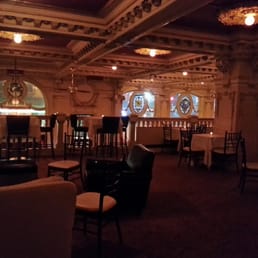Rather, in these settings, the Q&A presents the opportunity for other scholars to challenge one's conclusions, to bring up genuine inquiries as to theory, arguments, research, and even amplify the material that the writer has presented to the inquirer. It is extraordinarily intellectually stimulating.
Then came the signing the books that were purchased, and then signing the bookstore stock.
The American Slave Coast was launched. And it was over.
Providence Hotel, where we are staying. It's a multi-room establishment, including the room with the bar -- and unlike so many hotel restaurants and bars we observed during our various trips South to research The American Slave Coast, all the rooms were packed with diners. And there was a very good live jazz band playing. Some were the pre-theater crowd -- Providence's refurbished Gilded Age Playhouse's fall season is underway. Others were connected to some Brown event -- like us -- and others were just locals and visitors for one reason o another.
El V had crab cakes -- good for him, since I got to sample Providence's crab cakes. He also had clam chowder -- which I had earlier elsewhere. Both clam chowders were wonderful, but very different from each other, despite having the same basic ingredients, particularly the potatoes (also local) and clams. As usual he drank Guiness.
I had a watermelon salad, with arugula (just about to go off the menu now the cold has moved in along with the storms). I followed that with a half serving which was more than ample of braised scallops on a risotto bed, with citrus bits and greens.
 |
| You see the Gilded Age everywhere. The Dorrance building was originally a bank. Think Wharton, The Age of Innocence. |
In any food place we've been in Providence, whether a sandwich shop, coffee and tea and snacks, an old Irish pub with bar food -- Blakes Tavern is the one we went to, where I had my clam chowder experience -- the quality is high, and so is the attitude and service. Everyone seems genuinely pleased that you like their establishment and their food.
As we've long suspected, NYC's restaurant - food hype is way over-rated.
Here, partly, we're seeing the historical influence and experience of Rhode Island as a destination for the very wealthy to eat and vacation. In that sense too, not just the sea orientation, it is similar to Maryland's splendid culinary tradition of the best local produce, sea food, shell fish, meat and poultry, prepared with style and flavor and pride.
What a privilege it has been to be here, finally. Rhode Island may be small -- so small it never sent a delegation to the Constitutional Convention -- neither did New Jersey -- believing the larger states -- they were looking at Virginia -- would screw them over, not realizing how Connecticut would go to bat for the small states for equal representation with two legislative houses, the top one, the Senate, having only two from each state no matter territory or population. But it is fascinating and deep, particularly when explored from the perspectives of the slave and opium trade, smuggling and industry and -- well, money.
Everywhere we see the evidence of very old money for a very long time . . . . A tiered society's evidence in other words, writ large to view, because the state's territory is so small.
Tomorrow is going to be all about Rhode Island and her history as a native son historian takes us round.


No comments:
Post a Comment